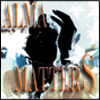 |
 |
|
|
|
|
 Alma "Matters" | 12-07-04 Alma "Matters" | 12-07-04Justine Frischmann by Mike Chen Justine Frischmann witnessed the highest of rock n’ roll highs and the lowest of drug addiction lows. Yet, she’s still here, she’s still sane, and she’s got a damn level head about the whole thing. In the mid 90s, you couldn’t avoid Justine Frischmann’s face in the media. Whether it was Elastica’s non-stop touring, the band’s videos on MTV, or magazine tabloid covers, Frischmann’s presence was always there. For many, it was a refreshing change of pace for a female singer. She wasn’t ditzy and oversexed like Mariah Carey, nor was she obnoxious and incoherent like Courtney Love. Frischmann was new-fashioned and old school at the same time: sexy, but tough; witty, but honest; musical, but educated. It’s safe to say she displayed more intelligence and charm in a single interview than Britney Spears or Jessica Simpson will muster out of their bottle-blonde heads during their entire careers.  Frischmann’s background doesn’t mirror that of a typical rock star, and perhaps that’s why she’s been involved in a variety of things outside of music after Elastica dissolved. A devoted art lover in her youth, Frischmann was a reluctant student of architecture at University College, London at the turn of the 1990s. But soon starting a band became a top priority with new boyfriend Brett Anderson and their mutual friend, Mat Osman. They selected the name Suede after acquiring a guitarist named Bernard Butler and a drummer named Simon Gilbert. Frischmann’s background doesn’t mirror that of a typical rock star, and perhaps that’s why she’s been involved in a variety of things outside of music after Elastica dissolved. A devoted art lover in her youth, Frischmann was a reluctant student of architecture at University College, London at the turn of the 1990s. But soon starting a band became a top priority with new boyfriend Brett Anderson and their mutual friend, Mat Osman. They selected the name Suede after acquiring a guitarist named Bernard Butler and a drummer named Simon Gilbert.
Clawing up the bottom of indie club bills throughout London, the band found themselves in awe of sharing the bill with big time indie standards, such as Blur, whose lead singer Damon Albarn took a liking to Frischmann. Audiences and other bands, however, weren’t terribly impressed. “I was horribly sensitive about the fact that a lot of people thought that we were shit. Who? Everyone!” said Frischmann in John Harris’ The Last Party. Relationship tensions between Frischmann and Anderson began to surface towards the end of 1990. In the beginning of the new year, Frischmann started a relationship with persistent suitor, Damon Albarn, but she remained with Suede for a few token months before severing her personal and professional relationship with Anderson, sparking Anderson to write the songs for Suede’s eventual breakthrough debut album. For Frischmann, it was time to start a band that would fulfill her distinct musical vision. “I have a low boredom threshold. I want the best bits - verse-chorus, verse-chorus, that's it. The whole thing of playing middle eights and triple choruses to finish isn't music, it's brainwashing,” she told The Observer. The Elastica project began with an ad in the British weekly, Melody Maker. Ad responders Annie Holland (bass), Justin Welch (drums) and Donna Matthews (guitar) solidified the final lineup and the band began recording demos in 1992. At the tail end of 1994, the band made waves in the British indie charts when the single “Stutter” was released. The wry lyrics about male impotence and the driving, bashing rhythm connected with listeners, including influential BBC DJ John Peel, who later invited the band in for recording sessions. There was an obvious homage (some say theft) of various post-punk bands. Most notably, Elastica’s critics zeroed in on the melody to “Line Up,” which cheerfully matched Wire’s “I Am the Fly.” The next single, “Connection,” was another Wire homage, using the similar stilted rhythms and choppy chord changes as found in Wire’s “Three Girl Rhumba.” Wire filed a lawsuit against Elastica, but an out-of-court settlement allowed Elastica’s eponymous debut to release in late 1994. The band was riding a wave of hype and their first album became the best selling debut album in British rock history. Part of the band’s hype involved Frischmann’s relationship with Damon Albarn. Albarn’s Blur had just conquered England with their quintessential Parklife album, and the pair became regular UK tabloid fodder. Later in 1995, however, Elastica’s singles became hits in the United States while Blur retained only a small niche American audience. The combination of mixed attention from both sides of the Atlantic tightened the screws on what was already becoming a tense relationship. Some of Elastica's stateside success was due to the sudden popularity in female fronted, guitar-oriented bands. This fact was not lost on Frischmann, though she did her best to downplay the significance of having three women in a band. "Male rock, if you will, has been with us for so long that a lot of the territory has been exhausted. Female rock is quite a new thing in many ways. The only time I get frustrated by all that is when writers look at us all the same. I love Polly Harvey, for instance, but we aren't saying the same things," she told the LA Times in 1996. As quickly and brightly as success shone on Elastica, tensions increased all around Frischmann. Her relationship with Albarn was becoming strained due to long periods of travel, a tinge of professional jealousy and his affinity for meaningless trysts. "When Elastica [was] successful I found that men were absolutely terrified of me. There was this myth that Damon and I had this open relationship, but I was never approached," she mused to Evening Standard magazine in March of 2000. Donna Matthews and Justin Welch started an ill-fated relationship that emphasized heroin use over intimacy. At the same time, constant tour demands and promotional appearances wore down the already battle-weary Frischmann. “Creative differences” regarding new material popped up between Frischmann and Matthews, which festered and grew until neither band member could be in the studio at the same time. As the Elastica machine slowly ground to a halt, Frischmann finally succumbed to external pressures and found escape in her bandmates' drug of choice, heroin. Frischmann remembers herself between 1996 and 1998 as a “sad junkie.” On the home front, Frischmann’s relationship with Albarn had fractured to the point that they lived separate lives. He desperately wanted Frischmann to settle down, have children and be a good mother, despite his obvious enjoyment of external sexual escapades. She saw this as another example of Albarn’s well-documented control-freak tendencies. After one last attempt on a weekend holiday to Bali in 1998, she ended her eight-year relationship with Albarn. Later that weekend, she severed ties with Matthews. It took another year of soul searching and restarting her life before Frischmann could begin toying with music again. After random live appearances, new band members and shotgun recording sessions, songs began to take form and Elastica returned. The Menace, Elastica's second and final album finally arrived in 2000. While some of the songs had floated around in various demo forms for years, the actual recording process was quick and dirty. Laden with synths and shoved together in a 13-week musical marathon, The Menace showcased the band's new, post-Donna Matthews sound. Unfortunately, the result was greeted with a major case of too little, too late. The Britpop movement had died several years before, and bands such as Blur, Suede, and Pulp had either moved on to new sounds or settled into semi-retirement. Pop music was dominating the charts and Elastica's decidedly un-pop approach and downbeat lyrics for The Menace pushed commercial success further out of reach. None of this really mattered to Frischmann, who saw the process of creating the album as a bit of catharsis on a number of fronts. "I was questioning whether I wanted to be in a band any more, and there was no one I could ask for advice. Getting success and everything you ever dreamed about is hard to handle, and makes you question everything," she told The Guardian in 2000 about the recording process. The inevitable band breakup happened quietly in 2001. Since then, Frischmann is doing what she wants, when she wants, and where she wants and that includes things outside of the music industry. She aims on keeping a low profile, devoid of stories of sex, drugs, tabloid covers and world tours. Her creative muse is still stirring, though it's found new roads to pave. Hosting architecture television shows for the BBC, DJing and narrating radio programs for BBC Radio are all capably handled under her grasp. Music hasn't totally left her life, though she hardly has any desire to return to the spotlight anytime soon. "I wrote the beat for and was involved in the production of [MIA's] next single ‘Galang’ and I've been working on production with some new bands including White Rose," she told the BBC earlier this year. Almost a decade has passed since the birth of the Britpop movement. What started as a mere hobby with her university boyfriend turned into a rollercoaster ride of five lifetimes for Justine Frischmann. Her time in the limelight saw a career book-ended by two albums written about her: Suede’s self-titled debut and Blur’s 13. Several years removed from the chaos of celebrity and rock n’ roll has given Frischmann the clarity to objectively look back at her involvement with the rise and fall of Britpop. She’s happy now with the realization that “sanity is more important than success.” For aspiring rock bands looking for fortune and glory, Frischmann’s story is a sobering journey that the ambitious should absorb. |
|
|
|
© 2005 sonic slang. All rights reserved. |
|
|

